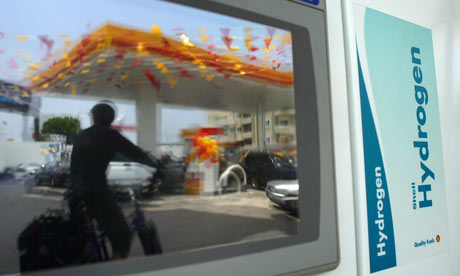
It might not be dead, but it's definitely on the sickbed. At the Frankfurt motor show this week, hydrogen cars were notable for their absence and electric vehicles (EVs) conspicuous by their presence. Similarly, at the Low Carbon Vehicle show in the UK last week, it was EVs all the way – I didn't see a hydrogen car in sight.
So what's going on? Have manufacturers looking for a green option decided that hydrogen is just too long-haul and that electricity is a better bet? Nissan seem to have taken that route, with senior vice-president Andy Palmer telling me last week that although their hydrogen vehicles are still under development, "the economics don't work today to make it any more than niche at the moment".
Nissan is plunging more than $300m (£183m) into developing its Leaf electric car, and is also researching plug-free charging to make EVs more convenient. Like all other car manufacturers, it needs to balance out cutting today's budgets with maintaining R&D for the future – and it seems to have decided the future is electric.
The same pattern seems to be repeating itself across the board. BMW's long-awaited hydrogen car, which I drove way back in 2007 still shows no signs of going into production, and meanwhile it's ploughing lots of energy into the launch of the electric Mini E, which will be put through its paces by consumers over the next year (a brilliant marketing plan allows consumers to sign up to lease the test-car and thus actually pay BMW to act as their research team. Genius.) Toyota may be promising to launch a hydrogen car in 2015, but it's the company's hybrids that are being pushed today, while Peugeot, Mercedes and Audi, all companies who have excitedly unveiled hydrogen plans in the past, are now suddenly silent on the fuel.
The great evangelist for hydrogen, Honda, which has poured millions into the technology and practically staked its success on the gas, opted out of Frankfurt for financial reasons this year. Perhaps the Honda folks are just feeling a bit too depressed. The fact is that, despite loads of hype about hydrogen highways and a hydrogen economy, there are only a few isolated spots in the world where you can even find a single hydrogen filling station. Germany recently committed to sorting out a hydrogen infrastructure, but really the world is much further along the path towards the infrastructure for electric vehicles than for hydrogen.
But don't give up on chemical symbol H yet. It's only three years since the documentary "Who killed the electric car?" hit our cinemas, after all.
The prospect of being able to turn water into fuel will also continue to hold an allure for many, and when oil prices start to head upwards again, car manufacturers will dust off their prototypes – desperate to flog whatever new low-carbon technology powers our cars, whether it's electricity, hydrogen, biofuel or something else.
For now, however, I reckon the future's electric.

